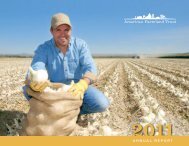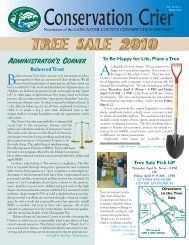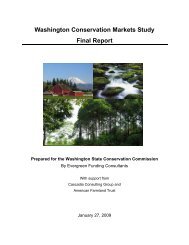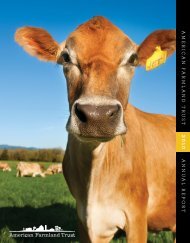Farms for the Future: Massachusetts - American Farmland Trust
Farms for the Future: Massachusetts - American Farmland Trust
Farms for the Future: Massachusetts - American Farmland Trust
Create successful ePaper yourself
Turn your PDF publications into a flip-book with our unique Google optimized e-Paper software.
<strong>Massachusetts</strong>’ Investments in <strong>Farmland</strong> ConservationFarm Viability Enhancement Program: Connecting <strong>Farms</strong> with ConsumersAt Diemand Farm in Wendell, plans to expand <strong>the</strong> refrigeration capacity are underway, madepossible by <strong>the</strong> FVEP. This is <strong>the</strong> second time <strong>the</strong> farm has made use of <strong>the</strong> program; <strong>the</strong> farmowes its current success in large part, says <strong>the</strong> Diemand family, to changes made through earlierbusiness planning and funding through <strong>the</strong> program.Be<strong>for</strong>e Diemand Farm enrolled in <strong>the</strong> FVEP, customers who wished to purchase <strong>the</strong> farm’s eggswould pick <strong>the</strong>m up from a self-serve outdoor refrigerator on <strong>the</strong> farm. The farm’s turkey potpieswere popular, but <strong>the</strong> farm produced only about 50 of <strong>the</strong>m a year. The FVEP grant changed this.Business planning allowed <strong>the</strong> family to explore <strong>the</strong> expansion of its product line and <strong>the</strong> constructionof a farm store. A Phase II grant put <strong>the</strong> plan into action.Today <strong>the</strong> farm sells eggs, fresh turkeys and chickens, turkey potpies, soups, ground turkey, fruitpies and cookies, maple syrup, honey and compost. The farm’s store employs one full-time andtwo part-time staff, and production of turkey potpies has multiplied to several hundred a year.Diemand Farm products can now be found in University of <strong>Massachusetts</strong> dining halls and in<strong>the</strong> Cooley Dickinson Hospital café and are available at local grocery stores and through a homedelivery service. Expanding <strong>the</strong> refrigeration capacity will open <strong>the</strong> door to fur<strong>the</strong>r market opportunities,helping <strong>the</strong> family meet growing demand <strong>for</strong> its products.Program DemandDemand <strong>for</strong> <strong>the</strong> FVEP has been relatively constant.In <strong>the</strong> past five years, <strong>the</strong> program received 293applications, 68 of which went unfunded. Whilesome of <strong>the</strong>se applications were deemed ineligible,some would likely have been funded had <strong>the</strong>resources been available. As older covenantsexpire, many program participants are seekingrenewal contracts to implement o<strong>the</strong>r componentsof <strong>the</strong>ir viability plan. Since 2004, 25 renewalapplications have been accepted. 33Leveraging Private DollarsAs with any type of business, farm upgrades andexpansions can be costly. The FVEP has helpedleverage bank financing <strong>for</strong> farm business improvementsand additional farm owner investments.Of FVEP participants to date, 73 percent haveinvested additional funds to complete improvementsdescribed in <strong>the</strong>ir viability plans. The totalestimated value of <strong>the</strong>se leveraged funds is overSeventy-three percent of FVEP participantscontribute additional funds to implement<strong>the</strong>ir viability plans, at an averageof $31,791 per farm. 35O<strong>the</strong>r Farm Viability ProgramsIn addition to <strong>the</strong> FVEP, a number of smaller programsare funded through <strong>the</strong> “farm viability”capital account.ACCELERATED CONSERVATIONPLANNING PARTNERSHIPWell-managed farms can provide multiple environmentalbenefits, from carbon sequestration towater filtration to wildlife habitat. While somefarming practices that provide habitat, conservewater or energy, or reduce fertilizer or pesticideuse are inexpensive to implement, o<strong>the</strong>rs can becomplicated and expensive. Accordingly, severalfederal and state conservation programs havebeen created to help farmers plan <strong>for</strong> and adoptconservation measures. One such program is <strong>the</strong>state’s Accelerated Conservation PlanningPartnership (ACPP), a program that helps farmersidentify <strong>the</strong> type of conservation practices thatmake sense <strong>for</strong> <strong>the</strong>ir farm.ACPP’s conservation planners provide farmersand o<strong>the</strong>r landowners with in<strong>for</strong>mation aboutstate and federal farm conservation programs.The program has developed conservation plans<strong>for</strong> more than 15,000 acres in nine <strong>Massachusetts</strong>counties, helping to ensure landowner eligibility<strong>for</strong> <strong>the</strong>se programs. Participants in <strong>the</strong> APR$6 million. 34 13<strong>American</strong> <strong>Farmland</strong> <strong>Trust</strong>


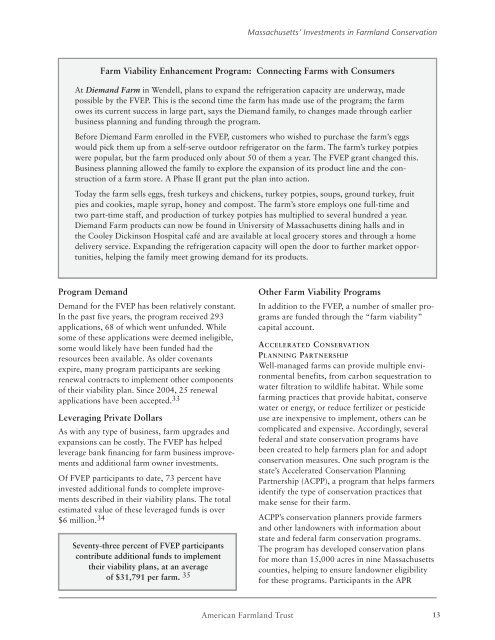
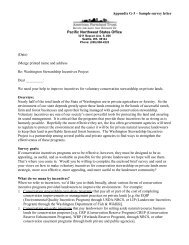

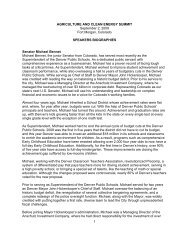
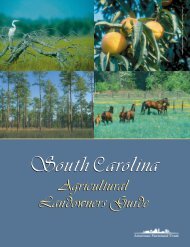
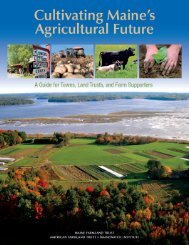
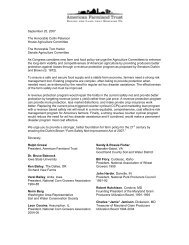
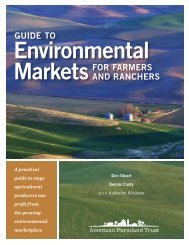
![Farmland by the Numbers [PDF] - American Farmland Trust](https://img.yumpu.com/31549391/1/190x245/farmland-by-the-numbers-pdf-american-farmland-trust.jpg?quality=85)
